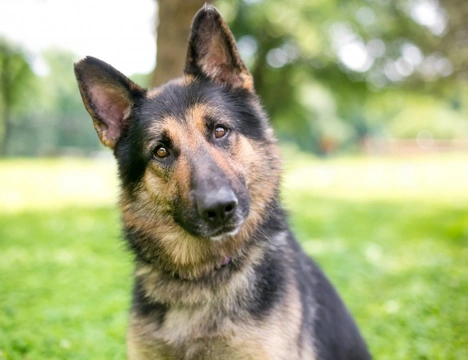Pets
Pets for studWanted petsBreedersAccessories & services
Knowledge hub
Support
Support & safety portal
Vestibulitis in dogs
What is Vestibulitis?
Vestibulitis describes inflammation of the vestibular system, which is part of the inner ear that controls balance, coordination, vision and hearing.
What Causes Vestibulitis?
Vestibulitis is often idiopathic (cause unknown), especially when it occurs in senior dogs. There are 2 types of vestibulitis; central vestibular disease and peripheral vestibular disease.
Central vestibular disease is a rare and serious condition that originates within the central nervous system and affects the brain.
Causes of central vestibulitis may include:
- Trauma or haemorrhage within the brain
- Inflammatory conditions of the brain
- Infectious conditions of the brain
- Cancerous brain lesions
- Insufficient blood flow to the brain (stroke-like episodes)
Peripheral vestibular disease is the more common form of vestibulitis which occurs when the nerves connecting the inner ear to the brain are inflamed and irritated. Causes may include:
- Middle or inner ear infection / foreign body in the ear
- Accidental rupture of the ear drum when cleaning the ears
- Injury or trauma to the head e.g. following a road accident or falling from a great height
- Hypothyroidism (an underactive thyroid)
- Tumours or polyps
- Meningoencephalitis (inflammation of the meninges, which are the connective tissues that cover the brain and spinal cord, and brain)
- Some ear medication (e.g. gentamicin, neomycin)
What Dogs are Most at Risk?
- Elderly dogs
- Dogs with a predisposition to ear problems
- Dogs suffering from a condition of the brain
- Dogs with hypothyroidism who have not been diagnosed or treated for the condition
- Puppies who are born with the condition; breeds in which vestibulitis can be congenital include the German Shepherd, Doberman, Akita, Cocker Spaniel, Fox Terrier (smooth coated), Tibetan Terrier and Beagle; fortunately, puppies who are born with vestibulitis do generally adapt fairly well and the symptoms may be a lot less evident as they get older
Symptoms
The symptoms of vestibulitis can come on very suddenly and be dramatic. They generally include:-
- Head tilt and circling (if the vestibulitis affects one ear only, the head tilt or circling will be in the direction of that ear)
- Stumbling, falling over or finding standing very difficult if not impossible
- Side to side involuntary eye movements (nystagmus); this can affect one or both eyes depending on whether one or both ears are affected
- Dizziness and poor coordination
- Drooling and / or vomiting
Any case of suspected vestibulitis warrants immediate veterinary intervention because it is essential to identify and treat the root cause of the condition, or to establish whether it is idiopathic. It is also very important to differentiate between peripheral vestibulitis and the more serious central vestibulitis, as well as rule out other conditions of the brain.
Diagnosing Vestibulitis
Vestibulitis is diagnosed by assessment of the symptoms and examination of the ears using an otoscope. Your vet may wish to take blood to test for hypothyroidism. Biopsies of any lumps and bumps found in the ears may be necessary. In cases of central vestibulitis, an MRI or CT scan and spinal tap may be required in order to identify the cause.
Additional tests may be advised if concurrent or related conditions are suspected.
Therapy
A dog suffering from acute vestibulitis may need to be hospitalised as the condition can make eating, drinking and moving around very difficult. It may be necessary to put the patient on a drip and feed him by hand. Anti-emetics may be required if the dog is vomiting.
For cases of peripheral vestibulitis, treatment is dependent on the root cause:-
- Antibiotics will be required to treat any infectious element
- Cessation of an ear medication such as gentamycin if this has been responsible
- Thyroid medication in the event of hypothyroidism
- Surgical removal of any polyps or tumours (although the outcome is less positive in the event of a neoplastic growth)
- Unfortunately central vestibulitis is less easy to treat and referral to a specialist is usually necessary.
Idiopathic vestibulitis in older dogs usually improves within a matter of a few weeks. Some tips to help a dog with the condition are:-
- Be prepared to assist feed your dog and help him to drink too
- Be aware he may need assistance getting out to urinate and defecate (a simple towel sling used to support him can be helpful and prevent a fall)
- Make sure your dog avoids stairs and steps; a baby gate is a good idea to prevent access to the staircase if there is one in your home; be prepared to lift your dog in and out of the car or up and down steps
- Make sure drug therapy if necessary is given in accordance with your vet’s instructions
- Be very careful with feeding if your dog has been vomiting; a soft, bland diet is advised during recovery
- If your dog is still very staggery and uncoordinated, make sure any furniture or ornaments within his reach are removed to prevent him from hurting him on them should he fall



